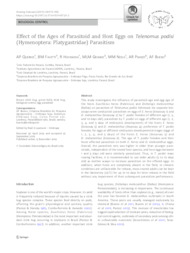Effect of the Ages of Parasitoid and Host Eggs on Telenomus podisi (Hymenoptera: Platygastridae) Parasitism.
Effect of the Ages of Parasitoid and Host Eggs on Telenomus podisi (Hymenoptera: Platygastridae) Parasitism.
Author(s): QUEIROZ, ANA PAULA; FAVETTI, B. M.; HAYASHIDA, R.; GRANDE, M. L. M; NEIVA, M. M.; PANIZZI, A. R.; BUENO, A. de F.
Summary: This study investigates the influence of parasitoid age and egg age of the hosts Euschistus heros (Fabricius) and Dichelops melacanthus (Dallas) on parasitism of Telenomus podisi Ashmead. Six separate bioassays were conducted: parasitism on eggs of E. heros (bioassay 1) and D. melacanthus (bioassay 2) by T. podisi females of different age (1, 5, and 10 days old); parasitism by T. podisi on eggs of different age (1, 2, 3, 4, and 5 days of embryonic development) of the hosts E. heros (bioassay 3) and D. melacanthus (bioassay 4); preference of T. podisi females for eggs at different embryonic developmental stages (eggs of 1, 2, 3, 4, and 5 days) of the hosts E. heros (bioassay 5) and D. melacanthus (bioassay 6). The age of T. podisi females and their hosts affected parasitism on both E. heros and D. melacanthus eggs. Overall, the parasitism rate was higher in older than younger parasitoids, independent of the tested host species, and host eggs between 1 and 3 days old were similarly parasitized. Thus, in T. podisi mass rearing facilities, it is recommended to use older adults (5 to 10 days old) as mother wasps to increase parasitism on the offered eggs. In addition, when hosts are completely absent in the field, or climatic conditions are unfavorable for release, mass-reared adults can be kept in the laboratory (25°C) for up to 10 days for later release in the field without any impairment of their subsequent parasitism performance.
Publication year: 2019
Types of publication: Journal article
Unit: Embrapa Wheat
Observation
Some of Embrapa's publications are published as ePub files. To read them, use or download one of the following free software options to your computer or mobile device. Android: Google Play Books; IOS: iBooks; Windows and Linux: Calibre.
Access other publications
Access the Agricultural Research Database (BDPA) to consult Embrapa's full library collection and records.
Visit Embrapa Bookstore to purchase books and other publications sold by Embrapa.

